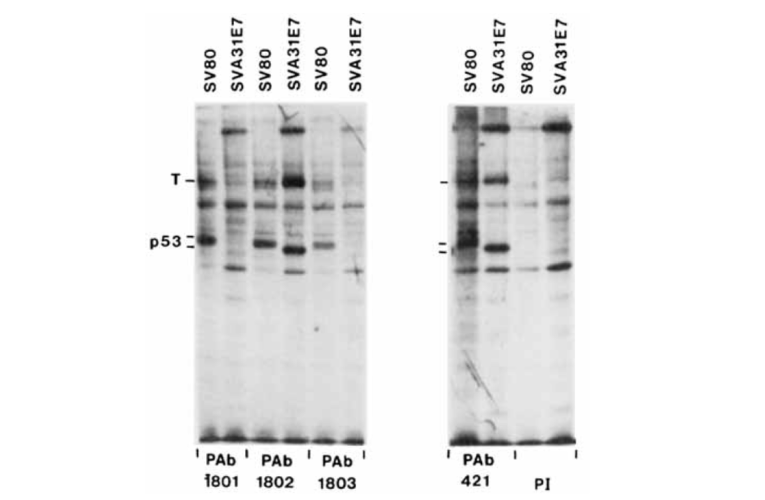Cat. #151144
Anti-p53 [Pab 1801]
Cat. #: 151144
Sub-type: Primary antibody
Unit size: 100 ug
Availability: 3-4 weeks
Target: p53
Class: Monoclonal
Application: ChIP ; ELISA ; FACS ; IHC ; IF ; IP ; RIA ; WB
Reactivity: Human
Host: Mouse
£300.00
This fee is applicable only for non-profit organisations. If you are a for-profit organisation or a researcher working on commercially-sponsored academic research, you will need to contact our licensing team for a commercial use license.
Contributor
Inventor: Lawrence Banks
Institute: Cancer Research UK, London Research Institute: Lincoln's Inn Fields
Primary Citation: Banks et al. 1986. Eur J Biochem. 159(3):529-34. PMID: 2428616.
Tool Details
*FOR RESEARCH USE ONLY
- Name: Anti-p53 [Pab 1801]
- Clone: Pab 1801
- Tool type ecom: Antibodies
- Tool sub type: Primary antibody
- Class: Monoclonal
- Conjugation: Unconjugated
- Molecular weight: 53 kDa
- Strain: Balb/c
- Reactivity: Human
- Host: Mouse
- Application: ChIP ; ELISA ; FACS ; IHC ; IF ; IP ; RIA ; WB
- Description: p53 is a stress-regulated transcription factor that regulates cell cycle arrest. Mutation of p53 is the most common genetic change so far identified in several major carcinomas. Pab 1801 is a monoclonal antibody for p53. Pab 1801 can be used for the specific detection of human p53 that is synthesised in the presence of p53 from other species. Pab 1801, recognises an epitope between amino acids 32 and 79 of both wild-type and mutant p53.
- Immunogen: Purified p53-b-galactosidase fusion proteins
- Isotype: IgG1
- Myeloma used: P3/NS1/1-Ag4.1
- Recommended controls: MDA-MB-231 cell line
Target Details
- Target: p53
- Molecular weight: 53 kDa
- Tissue cell line specificity: MDA-MB-231 cell line
- Target background: p53 is a crucial tumour suppressor involved in over 50% of cancers. It acts as a stress-responsive transcription factor and plays a vital role in regulating cell cycle arrest, promoting apoptosis, maintaining genomic stability, controlling the cell cycle, and inhibiting angiogenesis. Known as the "guardian of the genome," p53 prevents gene mutations.
Mutations in the p53 gene are common in human cancers, resulting in dysfunctional proteins unable to bind to DNA. This loss of fun...
Applications
- Application: ChIP ; ELISA ; FACS ; IHC ; IF ; IP ; RIA ; WB
Handling
- Format: Liquid
- Concentration: 1 mg/ml
- Unit size: 100 ug
- Storage buffer: PBS with 0.02% azide
- Storage conditions: -15° C to -25° C
- Shipping conditions: Shipping at 4° C
References
- Beckerman et al. 2016. Cell Cycle. :1-14. PMID: 27210019.
- Loughery et al. 2014. Nucleic Acids Res. 42(12):7666-80. PMID: 24928858.
- Thomas et al. 2013. J Biol Chem. 288(11):7606-17. PMID: 23341460.
- Thomas et al. 2012. PLoS One. 7(5):e36447. PMID: 22590546.
- Masters et al. 2003. J Pathol. 200(1):74-81. PMID: 12692844.
- Wolff et al. 2001. Oncogene. 20(11):1307-17. PMID: 11313875.
- Said et al. 1992. Am J Pathol. 141(6):1343-8. PMID: 1466398.
- Porter et al. 1992. Am...




